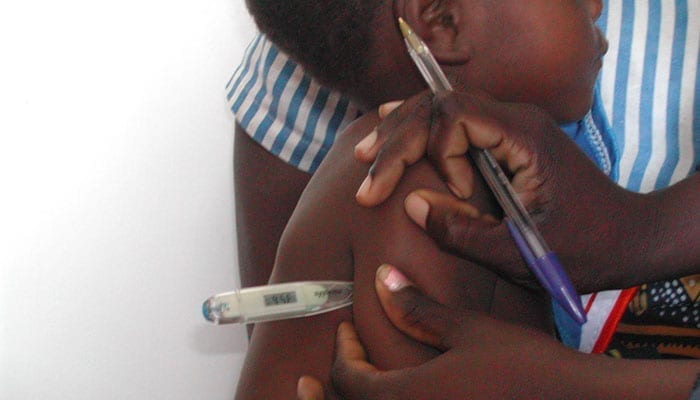The RTS,S vaccine (Mosquirix), approved by the European Medical Agency, has shown partial effectiveness – 31% in 6 to 12 weeks-old infants, and 56% in children aged 5 to 17 months. ISGlobal researcher, Carlota Dobaño, and her group, have been working over the past few years to understand the reasons for this variability and identify vaccine protection correlates.
In a recently published study, an international team led by Dobaño investigated not only the levels but also the type of antibodies induced by the vaccine, thanks to a quantitative assay developed by her group.
The results, published in BMC Medicine, shed new light on the mechanisms by which RTS,S confers protection and provide the basis for developing more efficacious vaccines.
In particular, they measured levels of antibody subclasses against different fragments of the CSP parasite protein and the Hepatitis B virus surface antigen (HBsAg), the two proteins comprised in RTS,S. They analysed serum and plasma from almost 200 infants and children from Kintampo, Ghana (an area with high malaria transmission) and Manhiça, Mozambique (low malaria transmission), vaccinated during the phase 3 clinical trial for RTS,S/AS01E.
The results confirm that the vaccine induces significant levels of IgG antibodies against both proteins (CSP and HBsAg), which are higher in children than in infants. However, not all subclasses of CSP antibodies seem to protect: IgG1 and IgG3 antibodies were associated with protection, while IgG2 and IgG4 were associated with higher disease risk.
“The balance between the different subclasses seems to be more important than the total IgG levels,” explains lead author Itziar Ubillos. “This could be because IgG1 and IgG3 antibodies have the capacity to stick to the parasite and give an ‘eat-me’ signal to cells of the immune system,” she adds.
The results also indicate that children with higher pre-vaccine levels of CSP antibodies were less protected against disease, post-vaccination. “This means that the vaccine will exert a larger benefit to infants who have not been exposed to the parasite in utero or during the first weeks of life,” explains Dobaño. “This study, fruit of many years of work and many collaborators, identifies new correlates of vaccine success and failure in African children and provides a basis for designing more efficacious vaccines,” says the researcher.
Baseline exposure, antibody subclass, and hepatitis B response differentially affect malaria protective immunity following RTS,S/AS01E vaccination in African children
https://doi.org/10.1186/s12916-018-1186-4



